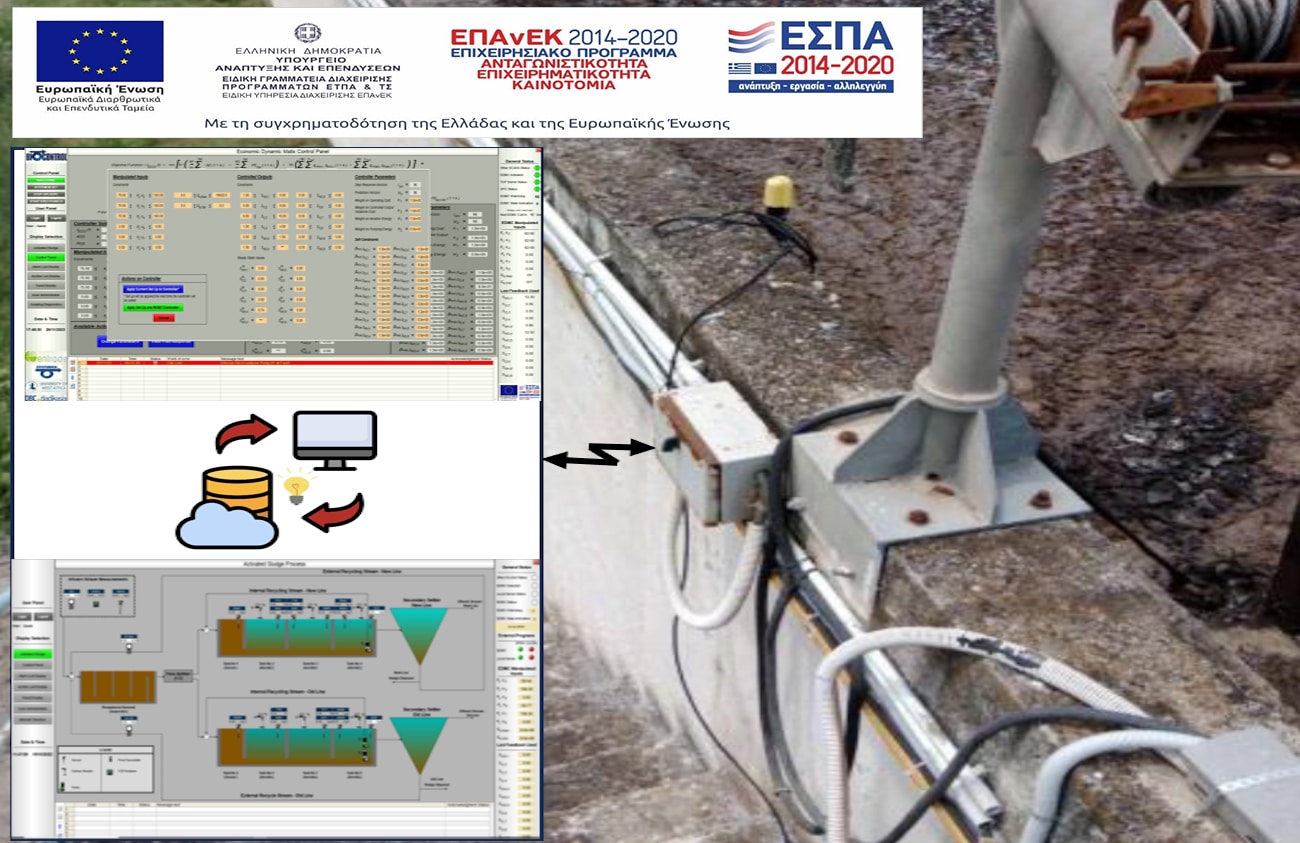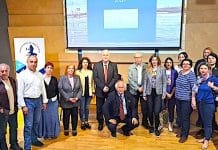 This project aims to the development of a novel control methodology for wastewater treatment plants (WWTPs), based on the Model Predictive Control (MPC) technique, i.e. the development and the implementation of a mathematical dynamic model of the process, as well as of the disturbances (the amount and the quality of the influent) for the prediction of the system future behavior.
This project aims to the development of a novel control methodology for wastewater treatment plants (WWTPs), based on the Model Predictive Control (MPC) technique, i.e. the development and the implementation of a mathematical dynamic model of the process, as well as of the disturbances (the amount and the quality of the influent) for the prediction of the system future behavior.
Accordingly, a mathematical optimization problem is formulated, whose objective function to be minimized includes the operational cost of the plant, where the main contributor is the aeration energy which is used for pumping air through the aerobic reactors of the secondary treatment process.
The quality of the effluent discharged to the environment is assured by introducing appropriate constraints to the optimization problem. Tuning of the parameters involved in the economic optimization control problem is performed through extensive tests on a dynamic simulator that is developed and tailored to the specific characteristics of each WWTP.
The project includes the installation and implementation of the necessary portable measuring equipment, software and the proposed control methodology to the WWTP located at Sparta, Laconia, which will enable the collection and processing of real industrial data, the evaluation of the benefits of the proposed methodology and the comparison to the existing methodologies.
Apart from the obvious benefits on the operation of existing WWTS (reduction of both energy expenses and emissions of gaseous pollutants) and job creation, we strongly believe that a very important business opportunity will be created by integrating the method into new WWTPs, mainly in developing countries, where sewage treatment is still very limited.
The project also includes a detailed and extensive plan for the management, exploitation, protection and dissemination of the project’s results, consisting of the following actions: publications in international peer-reviewed scientific journals and national and international conferences, organization of a workshop and a scientific conference, creation of a website and updating scientific social media, participation and presentation of the control methodology in trade fairs and patent applications.
Project Τitle: Development of a novel model predictive control method for sewage treatment plants aiming at optimizing performance and minimizing energy consumption
Acronym: BIOCONTROL
Project Duration: 30/11/2021 – 29/11/2023
Project URL: https://bio-control.gr/
Project Framework & Funding: This research has been co-financed by the European Regional Development Fund of the European Union and Greek national funds through the Operational Program Competitiveness, Entrepreneurship and Innovation, under the call RESEARCH – CREATE – INNOVATE (project code: Τ2ΕΔΚ-02191).
Funding: UniWA: 202.591,75 € (Total project budget: 997.059,75 €)
Scientific coordinator (UNIWA): Dr. Alex Alexandridis, Professor, Email: alexx@uniwa.gr
Consortium – Partners:
- DIADIKASIA BUSINESS CONSULTING (Coordinator)
- University of West Attica – Department of Electrical and Electronic Engineering – Laboratory of Telecommunications, Signal Processing and Intelligent Systems (TELSIP)
- ENERGY TRADING A.E
- GEORGIOS VAGGELATOS (Systemica)
Research Publications / Results / Patents
Journal publications
- Kalogeropoulos, I., A. Alexandridis, H. Sarimveis, “Economic Oriented Dynamic Matrix Control of Wastewater Treatment Plants”, Journal of Process Control, 118 (2022) 202–217.
- Papadimitrakis, M., A. Alexandridis, “Active vehicle suspension control using road preview model predictive control and radial basis function networks”, Applied Soft Computing, 120C (2022), 108646.
- Protoulis, T., H. Sarimveis, A. Alexandridis, “Development and identification of a reduced-order dynamic model for wastewater treatment plants”, Submitted, 2023
- Protoulis, T., Kordatos, I., Kalogeropoulos, I., Sarimveis, H., Alexandridis, A., “Control of wastewater treatment plants using economic-oriented MPC and recurrent neural network disturbance prediction models”, Submitted, 2023
- Kalogeropoulos, I., Protoulis, T., Kordatos, I, Zervas, P.L., Sarimveis, H., Alexandridis, A., “An integrated control framework for a real-world wastewater treatment plant”, Submitted, 2023
Conference publications
- Protoulis, T., I. Kalogeropoulos, I. Kordatos, P.L. Zervas, H. Sarimveis A. Alexandridis, “An Economic-Oriented Model Predictive Control Framework for the Efficient Energy Operation of Wastewater Treatment Plants”, IEEE 4th International Conference on Communications, Information, Electronic and Energy Systems, 2023, Plovdiv, Bulgaria.
- Protoulis, T., I. Kalogeropoulos, I. Kordatos, A. Kapnopoulos, P.L. Zervas, H. Sarimveis A. Alexandridis, “An Ιdentification and Control Framework for Optimizing the Energy Consumption of a Wastewater Treatment Plant”, IEEE 6th International Conference AND workshop in Óbuda on Electrical and Power Engineering (CANDO EPE), 2023, Budapest, Hungary.
- Protoulis, T., I. Kalogeropoulos, I. Kordatos, H. Sarimveis, A. Alexandridis, “A machine learning dynamic modelling scheme for wastewater treatment plants using cooperative particle swarm optimization and neural networks”, 33th European Symposium on Computer Aided Chemical Engineering (ESCAPE 33), 2023, Athens, Greece.
- Kalogeropoulos, I., T. Protoulis, I. Kordatos, P.L. Zervas, H. Sarimveis, A. Alexandridis, “A dynamic simulator for optimizing the operation of wastewater treatment plants”, 18th Conference on Sustainable Development of Energy, Water and Environment Systems, 2023, Dubrovnik, Croatia.
- Papadimitrakis, M., A. Alexandridis, “A Vessel Propulsion Controller based on Economic Model Predictive Control”, 2023 American Control Conference (ACC), 2023, San Diego, USA.
- Kalogeropoulos, I., T. Protoulis, I. Kordatos, A. Kapnopoulos, P.L. Zervas, H. Sarimveis A. Alexandridis, “An integrated PSO – DMC framework for the identification and control of wastewater treatment plants”, 1st International Conference on Sustainable Chemical and Environmental Engineering (SUSTENG), 2022, Rethymno, Greece












